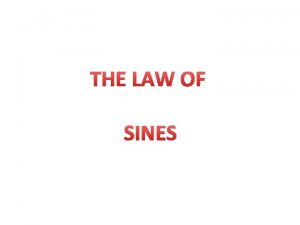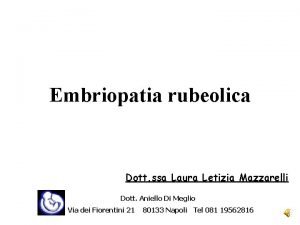Comparative Law Prof ssa Letizia Coppo THE WESTERN













- Slides: 13

Comparative Law Prof. ssa Letizia Coppo

THE WESTERN LEGAL TRADITION CIVIL LAW v. COMMON LAW Civil law: the expression comes from jus civile and refers to all those experiences that from a historical viewpoint have their roots in Medieval continental Europe. [see annex] Common law: the expression comes from jus commune and refers to all those experiences that have their roots in Medieval and modern English law.

CIVIL LAW v. COMMON LAW Legal tradition: according to John Merryman (*) it is ‘a set of deeply rooted, historically conditioned attitudes about the nature of law, about the role of law in the society and the polity, about the proper organization and operation of the legal system, and about the way law is or should be made, applied, studied, perfected, and taught’. (*) J. MERRYMAN, The Civil Law Tradition: An Introduction to the Legal Systems of Western Europe and Latin America, 1985.

CIVIL LAW v. COMMON LAW Historical remarks on the major divergences • In the age of the great codifications the opposition between civil law and common law was grounded on the presence or absence of codified law. • At the beginning of the XX century the difference was said to be that civil law countries were based on written law, while common law countries on unwritten customary law. • Another difference was that in Common law countries judgments are a source of law.

CIVIL LAW v. COMMON LAW Historical remarks on the major convergences • Constitutionalisation of the system: both in common law and civil law constitutional legality prevails over legislation and political power. • Spread of French revolution values in both systems: democratic representation, laicité, solidarity or fraternity, equality and liberty. • Renewed interest in mixed systems, as they cast light on the strengths and weaknesses of the two traditions.

THE CONCEPT OF ‘WESTERN LEGAL TRADITION’ The comparison between civil law and common law reveals: 1. a shared political and cultural background 2. a different legal and technical background 3. shared contemporary problems and challenges A proper reconstruction of the historical background is crucial to understand the reasons underlying such convergences and divergences.

THE CONCEPT OF ‘WESTERN LEGAL TRADITION’ Historical background: two crucial stages for the development of the Western Legal Tradition • Medieval common background: creation of a wide area of jus commune, as all the different political organisations on the European territory evolved through identical organisational and procedural schemes. • Gregorian reform: sub-product of the great effort to rebuild the Roman Catholic Church.

THE CONCEPT OF ‘WESTERN LEGAL TRADITION’ Features of the Medieval common background: • Fusion of heterogeneous components coming both from the late Roman law and from the Germanic tradition. • Creation of open systems which were a mixture of sources with different origins and nature: ecclesiastical, lay, royal and customary. The fracture came with the spread of the ‘scientia juris’, with its ordering categories (see below).

FEATURES OF THE WESTERN LEGAL TRADITION 1) Law is conceived as something autonomous from religion and politics: those latter can and do have an impact on law, but they are not identified with it. 2) Law is committed to professionals provided with specific skills and background, a specific linguistic and conceptual apparatus and a specific literature. And such technical background becomes an organisational formant of the system: legal institutions can be perceived only through the mentioned apparatus of concepts.

FEATURES OF THE WESTERN LEGAL TRADITION 3) Law is conceived as a coherent system, i. e. an integrated and autopoietic system, capable of developing through time as it includes tools for self-regulation and adaptation to external changes of circumstances. 2 keywords: • vitality of the system • legitimacy of the system

FEATURES OF THE WESTERN LEGAL TRADITION 1. Vitality of the system: it depends upon the necessity to ensure coordination among the plurality of orderings that live together and compete within the same community. 2. Legitimacy of the system: it is based on the fact that the system identifies itself with the superior concept of order. < Western conception of the world as an ordered set of phenomena; law is the order of human relationships that mirrors the order of things.

FEATURES OF THE WESTERN LEGAL TRADITION 4) Assumption that the single rules are intelligible only when located in the context of conceptually ordered procedures and institutions. 5) Assumption that legality prevails over sovereignty, i. e. political power is not allowed to take over the legal ordering, which provides itself the appropriate procedures for the legitimate expression of political will. • This latter way of thinking developed in Europe during the XI century and involves the never ending issue of the relationship between law, justice, politics, morals and religion.

RELEVANT CHRONOLOGICAL STEPS OF THE WESTERN LEGAL TRADITION 1) Formation or formative stage (around XII and XIV century) 2) The age of consolidation (from XIV to XVIII century) 3) The age of revolutions (from the 2 nd half of XVIII century to the 1 st world war) 4) Contemporary age (from 1930 to nowadays)






















